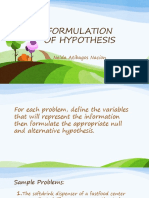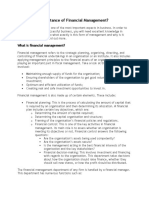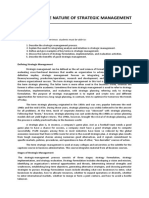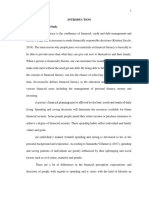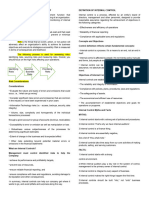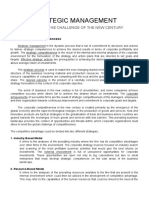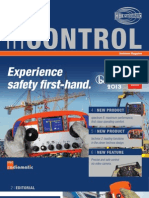Toyota Product Recall
Uploaded by
Junegil FabularToyota Product Recall
Uploaded by
Junegil FabularCase No.
1- TOYOTA RECALLS 700,000 VEHICLES IN USA AMID SAFETY CONCERNS
1. What is the role of Operations on the reputation of Toyota in the article?
Toyota has built the reputation of being reliable and safe and it is due to their
operations management.
The operations is responsible for providing the best quality, lowest cost and
shortest lead time through elimination of waste which may take in the form of excess
inventory, extraneous processing steps, and defective products. This means that
operations is involve in scrutinizing the quality of products and its manufacturing
process. Operations makes sure the most advance techniques in manufacturing are used
in order to maintain the uniformity of the quality of output, the procedures are simplified
and the cost are reduced. Operation is also responsible for the management of resources
as well as distribution of products in an efficient manner. This was achieved by Toyota
through the use of Just in Time which means building what is needed when it is needed.
The operations is also involved in Research and Development which ensures advanced
features in its products.
2. What areas in Operations should Toyota focus on to regain its global competitiveness?
I believe that prevention is better than cure and for Toyota to regain its global
competitiveness, it must avoid producing defective items in order to not further destroy its
already tainted reputation.
Toyota should invest more in its Research and Development. The cause of the
series of product recall could be due to faulty design of parts and this can only be resolved
by further research and development. In order to achieve the most appropriate design for
the desired performance, ample resources must be poured in the Research and
Development phase of the product.
Quality control is also another area that should be revisited by Toyota. Quality
control ensures that product quality is maintained or improved. This is done by training
personnel, creating standards for product quality, and testing products to check
for substantial variations. These controls provides standards to which employees must
adhere to. By specifying which production activities are to be performed by a particular
personnel reduces the possibility that employees will be performing tasks which they are
not adequately trained for. Intensifying quality control reduces the risk of producing
defective parts.
You might also like
- Asset Allocation 5E (PB): Balancing Financial Risk, Fifth EditionFrom EverandAsset Allocation 5E (PB): Balancing Financial Risk, Fifth Edition4/5 (13)
- The Relationship Between HRM Strategies and Sustainable Competitive Advantage Testing The Mediating Role of Strategic AgilityNo ratings yetThe Relationship Between HRM Strategies and Sustainable Competitive Advantage Testing The Mediating Role of Strategic Agility15 pages
- Formulation of Hypothesis: Nelda Atibagos NacionNo ratings yetFormulation of Hypothesis: Nelda Atibagos Nacion7 pages
- What Is The Importance of Financial ManagementNo ratings yetWhat Is The Importance of Financial Management2 pages
- WORKBOOK in Assessment of Student Learning 2No ratings yetWORKBOOK in Assessment of Student Learning 299 pages
- The Impact of Financial Literacy On Investment Behaviour100% (1)The Impact of Financial Literacy On Investment Behaviour5 pages
- Caca&Caillo - Developing Products For The Foreign Market Entry Strategies0% (1)Caca&Caillo - Developing Products For The Foreign Market Entry Strategies18 pages
- Kirumbi S - 2019 - The Impact of Financial Literacy On The Performance of Small and Medium Scale Enterprises in Morogoro Municipal100% (1)Kirumbi S - 2019 - The Impact of Financial Literacy On The Performance of Small and Medium Scale Enterprises in Morogoro Municipal101 pages
- CHAPTER-1 Nature-of-StatMgmt STRAT MGMTNo ratings yetCHAPTER-1 Nature-of-StatMgmt STRAT MGMT11 pages
- Chapter 17: Career Management and DevelopmentNo ratings yetChapter 17: Career Management and Development10 pages
- 02 - PFM - Chapter 1 - Introduction To Personal Financial ManagementNo ratings yet02 - PFM - Chapter 1 - Introduction To Personal Financial Management9 pages
- SYNTHESIS (Chapter 1) - FINANCIAL MANGEMENT 1No ratings yetSYNTHESIS (Chapter 1) - FINANCIAL MANGEMENT 13 pages
- Chapter 4: Planning: Part 2: Stategy Formulation and ImplementationNo ratings yetChapter 4: Planning: Part 2: Stategy Formulation and Implementation32 pages
- Personal Financial Management Practices and Lived Experiences of Teachers in The Third Congressional District of QuezonNo ratings yetPersonal Financial Management Practices and Lived Experiences of Teachers in The Third Congressional District of Quezon10 pages
- Chapter 7 - Implementing Strategies Marketing, Finance Accounting, R&D, and MIS IssuesNo ratings yetChapter 7 - Implementing Strategies Marketing, Finance Accounting, R&D, and MIS Issues26 pages
- Strategic Management - Module 3 - Strategy Formulation100% (1)Strategic Management - Module 3 - Strategy Formulation4 pages
- Financial Planning - Definition, Objectives and ImportanceNo ratings yetFinancial Planning - Definition, Objectives and Importance4 pages
- Financial Literacy of Teachers and School Heads in The Division of Marinduque: Basis For Financial Education Enhancement ProgramNo ratings yetFinancial Literacy of Teachers and School Heads in The Division of Marinduque: Basis For Financial Education Enhancement Program12 pages
- Level of Financial Wellness of Taguig City University Non Teaching Personnel FINAL OUTPUTNo ratings yetLevel of Financial Wellness of Taguig City University Non Teaching Personnel FINAL OUTPUT43 pages
- Marketing Competency, Marketing Innovation and Sustainable Competitive Advantage of Small and Medium Enterprises A Mixed-Method AnalysisNo ratings yetMarketing Competency, Marketing Innovation and Sustainable Competitive Advantage of Small and Medium Enterprises A Mixed-Method Analysis18 pages
- Chapter 1: Managers, Profits, and Markets: Multiple ChoiceNo ratings yetChapter 1: Managers, Profits, and Markets: Multiple Choice10 pages
- SAMPLE-STRATEGIC-MANAGEMENT-Paper-Capstone-Project100% (1)SAMPLE-STRATEGIC-MANAGEMENT-Paper-Capstone-Project6 pages
- Advanced Production and Operations Management (OM0013)No ratings yetAdvanced Production and Operations Management (OM0013)11 pages
- The Case for Masks: Science-Based Advice for Living During the Coronavirus PandemicFrom EverandThe Case for Masks: Science-Based Advice for Living During the Coronavirus PandemicNo ratings yet
- Lean-based Production Management: Practical Lean ManufacturingFrom EverandLean-based Production Management: Practical Lean ManufacturingNo ratings yet
- Priority Investment Plan: Cy 2010-2015: Barangay Dao-Angan-Boliney, Abra Province of AbraNo ratings yetPriority Investment Plan: Cy 2010-2015: Barangay Dao-Angan-Boliney, Abra Province of Abra5 pages
- 22.026.DSTA - CS: Virtual Assistant For Video Conference SystemNo ratings yet22.026.DSTA - CS: Virtual Assistant For Video Conference System9 pages
- Entrepreneurial Orientation (EO) :: Question 1b. AnswerNo ratings yetEntrepreneurial Orientation (EO) :: Question 1b. Answer8 pages
- Marking of Vehicle Parts and Workshop Equipment: Group StandardNo ratings yetMarking of Vehicle Parts and Workshop Equipment: Group Standard14 pages
- Nestle Marketing Communication Children PolicyNo ratings yetNestle Marketing Communication Children Policy6 pages
- Measurement Principle of Ultrasonic SensorNo ratings yetMeasurement Principle of Ultrasonic Sensor3 pages
- Job Description - Client Services Representative (PG)-1No ratings yetJob Description - Client Services Representative (PG)-12 pages
- Faculty of Engineering and Technology Semester End Examination Question Paper - M. TechNo ratings yetFaculty of Engineering and Technology Semester End Examination Question Paper - M. Tech3 pages






